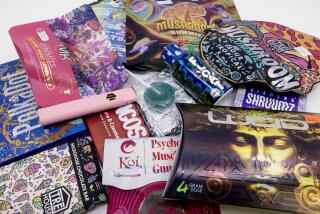Coca-Cola Objects to ‘Coke’ Magic Powder
- Share via
CHICAGO — Coca-Cola Co. officials don’t want people buying little bottles of “Mad Scientist Magic Powder” because they say it might just make them think there’s “coke” in their Coke.
The “magic powder” is a powdered bubble gum produced in Italy and distributed in this country by Alma-Leo U.S.A. Inc. of Northbrook, Ill., a Chicago suburb. The company sells it in tiny plastic bottles that Coca-Cola officials say are shaped like their old soda bottles.
The soft-drink giant sued Alma-Leo, and briefs in the case were heard Wednesday by U.S. District Judge James Moran.
Coca-Cola maintains that the bubble gum’s packaging may create a connection between their product and cocaine.
Sales Suspended
While an extract of the coca leaf is used as a flavoring in Coca-Cola, cocaine itself is not, and never has been, an ingredient in the soft drink, according to Randy Donaldson. manager for public relations for Coca-Cola.
Floyd A. Mandell, attorney for Alma-Leo, said he thinks that Coca-Cola is overreacting.
“It doesn’t even look like cocaine, it looks like powdered candy,” Mandell said. “There’s yellowish-white powder in the little yellow bottles and pink powder in the little pink bottles. You chew it and it turns into bubble gum and changes color.”
Mandell said Alma-Leo is a small, privately held company that sells novelty candy products manufactured by other concerns.
The lawsuit accuses Alma-Leo of trademark infringement, unfair competition and consumer fraud. Donaldson said the company wants Moran to issue a cease-and-desist order on sales of the plastic bottles and is seeking monetary relief in an amount to be set by the court.
Sales of the bubble gum have been suspended while the judge considers the briefs.
Donaldson said the “Magic Powder” bottles appear to be miniature versions of Coca-Cola’s old 6 1/2-ounce bottles. “The shape of those bottles is trademarked,” he said.
Mandell, however, calls them nondescript “contour bottles” and says there is no direct resemblance to Coca-Cola’s.
Mandell said the company offered to stop selling the bottles once the current three-month supply runs out, but Coca-Cola wasn’t satisfied, and demanded that no more of them be sold.
More to Read
Inside the business of entertainment
The Wide Shot brings you news, analysis and insights on everything from streaming wars to production — and what it all means for the future.
You may occasionally receive promotional content from the Los Angeles Times.










